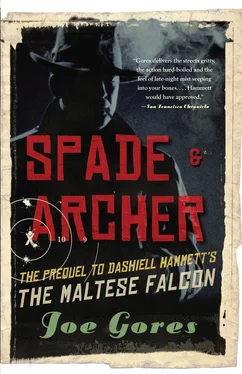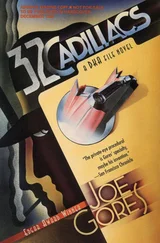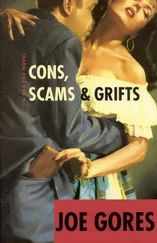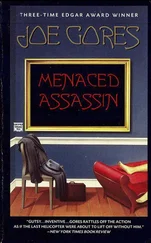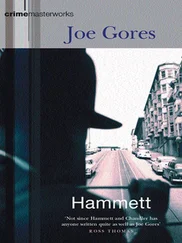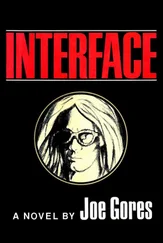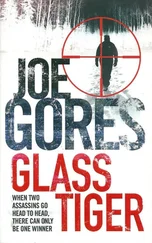“More involved in her charity work than ever.”
Barber leaned in, lowered his voice.
“I had a long discussion with Spaulding yesterday about Cal-Cit’s refusal of access to Collin’s financial papers. He says it’s because of embarrassment, plain and simple. They were sloppy in their controls on certain accounts that — that Collin was intimately involved in.”
“Those accounts have to do with mining stocks?”
“How did you know that?”
The waiter appeared with their meals. Spade cut into his steak, gestured across the table at Barber with the knife.
“I talked with Eberhard’s broker. He said Eberhard — and his bank — got wealthy on speculative gold-mining-stock investments during the past four years. Before that—”
“Before that both Collin and his bank were struggling.” Barber grimaced. “Spaulding says they’re embarrassed because the bank stopped monitoring their dealings with the mining syndicate on Collin’s word that he was monitoring both his investments and the bank’s very closely.”
“It was unwise banking procedures, nothing more?”
“So Spaulding says. I have no, er, solid reason to disbelieve him.”
“Then why the stonewall with Eberhard’s widow?”
“They’re waiting for the insurance situation to resolve itself.” He met Spade’s eyes. “I’m waffling, aren’t I?”
“Yeah.”
Barber glanced around, leaned closer again.
“There are some things that continue to bother me. But... we can’t discuss them here.”
He gestured to the waiter, signed the chit. Their exit from the dining room was again a progression, with nods and waves and handshakes and polite comments from the wealthy and powerful in the room. In the doorway Reginald materialized.
“Brandy and cigars in the library, Reginald.”
“Very good, Mr. Barber.”
After leaving the elevator at the second-floor foyer, Barber and Spade turned left through a wide doorway into the library. All four walls, between windows and doors, were lined with bookshelves from floor to ceiling. Around three sides of the room was a balcony with a waist-high railing.
There was a single window in the right-hand wall that looked down on Taylor Street. In front of the window was a bookcase topped by an ancient-looking three-foot-high brass statue of some fierce-eyed predatory bird with its beak broken off or worn away by time.
“A falcon?” Spade asked.
“An owl. It is a replica of an ancient Athenian owl acquired for the club by Henry Norse Stephens during a trip to Greece in nineteen eleven. The owl is the symbol of the Bohemian Club.”
“Why?” asked Spade bluntly.
“Um — the — er — the owl sees through darkness to— too...”
“To truth?”
“Yes. To truth. And from truth comes knowledge.”
“And from knowledge comes wisdom?”
“That’s it. Wisdom. That’s why the club slogan is ‘Weaving Spiders Come Not Here.’ ”
Spade moved farther into the library. “I don’t see the connection with the weaving spiders,” he said.
“Wisdom only comes from contemplation and discussion of philosophical views, not from business. So, no business here.”
“I read somewhere that during medieval times, even the Renaissance, the owl was the symbol of evil because it was the bird of darkness.”
Down the center of the room, on a pinkish Turkish rug laid over a green carpet, were several hardwood tables on which lay several open reference volumes. There were three more windows in the long Post Street wall, with gauzy lace curtains to cut the glare. Below the high ceiling were three ornate chandeliers, each with twenty electric candles in brass candelabras.
In front of the center window were pairs of leather armchairs faced at comfortable angles to each other. Beside each chair was a brass floor lamp and a smoking table.
Reginald appeared with a tray bearing brandy snifters, a cut glass decanter of cognac, and a silver humidor. He set the tray down on a large table in the front corner of the room, bowed, departed. They selected cigars, poured cognac, moved to two of the padded leather armchairs, sat down. They toasted each other, sipped, drifted fragrant smoke into the air.
“OK,” said Spade, “nothing illegal about Cal-Cit’s banking practices. But if everything is on the up-and-up, why deny the widow access? Why not make the will public?”
“Spaulding tried to reiterate that it was confidential bank business. I said I was the president of a bank myself, and knew better. Plus I was a member of the Banking Commission. Then he tried to say the police had told them not to release any information. Then he tried to refer me to counsel. I said I was talking with him, right then and there, face-to-face. He finally opened up about the mining stocks. Under Collin’s direction the bank had lent money to a Sacramento-based Blue Sky Mining and Development Syndicate, run by a speculator named Devlin St. James, so they could develop mines in the Sierra.”
“What does St. James look like?” demanded Spade quickly.
“Apart from Collin, nobody ever met him. Communication was by telephone or letter. For each new mine the syndicate borrowed ten thousand dollars on a note from Cal-Cit co-signed by St. James and endorsed by the syndicate. After a mine was developed the bank loan was repaid with interest and a fifteen-percent commission override. In return the syndicate kept very heavy deposits in the bank, which were vital to Cal-Cit’s financial health.”
Spade swirled his snifter. “Ring around the rosy.”
“But then Eberhard died and the syndicate, and St. James, drew out all of the money they had on deposit. The bank panicked. Spaulding, as acting president, tried to call in the syndicate’s notes. The syndicate said all of the money had been spent in developing new mines.”
“So of course the bank tried to seize the syndicate’s assets,” said Spade, “and there weren’t any.”
“Just a storefront office on a Sacramento side street with a filing cabinet and a chair and a desk and a typewriter and a telephone. A dollar-a-day clerk to answer the phone and type the letters he was told to type. If anyone came around asking, St. James was in the High Sierra searching out new mines to lease.”
“They get a description of St. James from the clerk?”
“He was hired by an employment agency.”
“And the agency was hired by letter?”
“By phone, actually. How do you know all of this, Spade?”
“You know banking. I know con games and frauds. Your Devlin St. James is the mystery man you saw at the Neptune Bath House, and was the man arguing with Eberhard at his home. He somehow got Eberhard to help him run a shell game with the bank’s money and Eberhard’s money and his own money from some source — I’m pretty sure not from gold mines.”
“I refuse to believe that Collin Eberhard was a crook!”
“He’s dead, so we can’t ask him.”
Barber mopped his face, gulped the last of his cognac.
“Yes, Collin is dead. And St. James is gone, the syndicate is gone, the syndicate’s records — including the names and locations of the mines — are gone. The bank’s money is gone. If that gets out there will be a panic among their depositors. So I feel their actions reflect incompetence, not anything illegal.”
Spade drained his own snifter, shook his head.
“I could almost buy that everyone was conned. Almost. But it doesn’t work. Spaulding has to be in on the fraud now, or Eberhard was before his death, or both. Otherwise Cal-Cit would be seeking criminal indictments from the state attorney general and opening up their books. And then there’s Evelyn Eberhard.”
“Surely Evelyn wasn’t involved.”
Читать дальше
